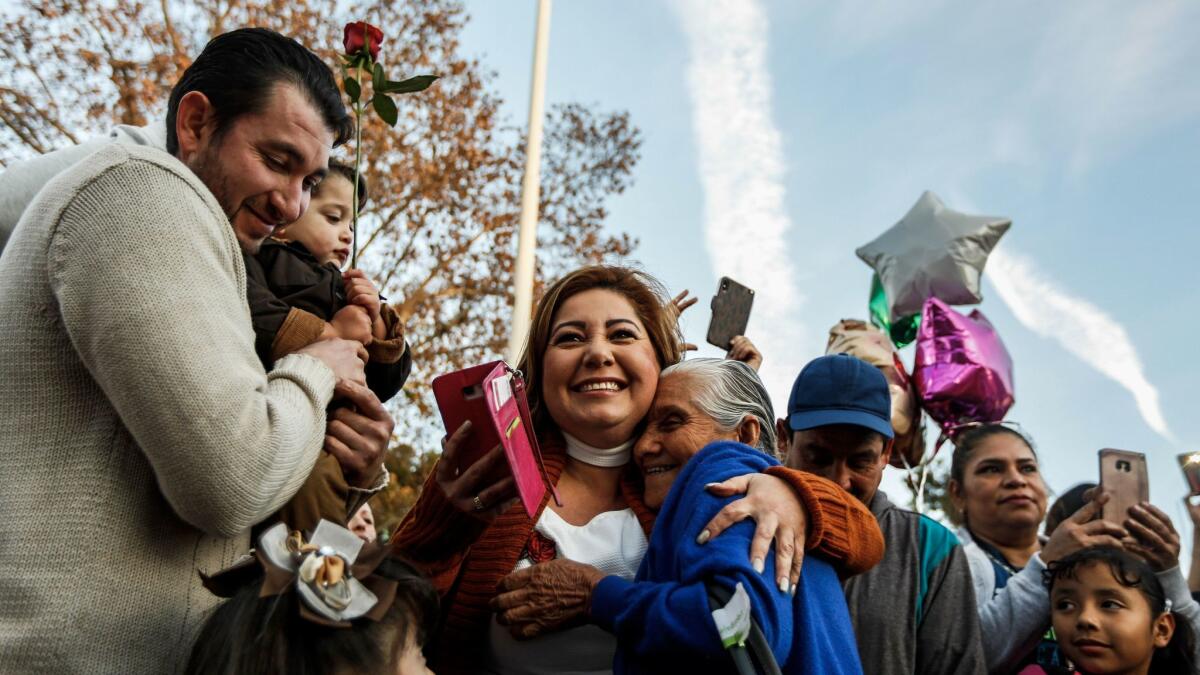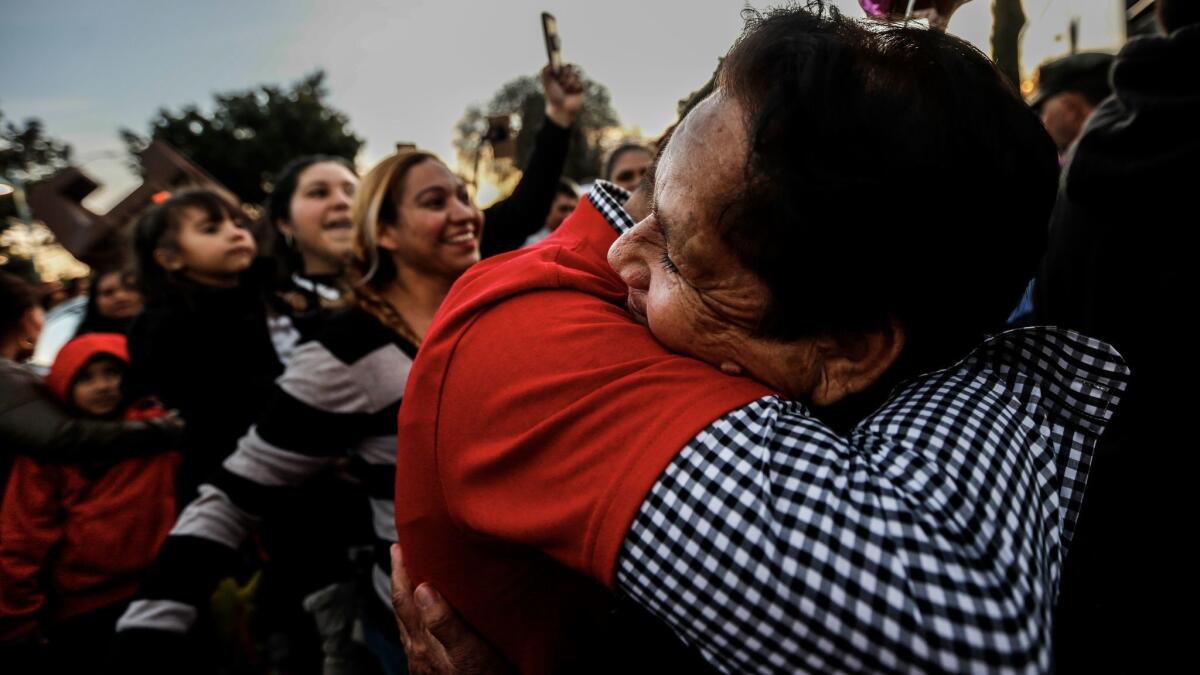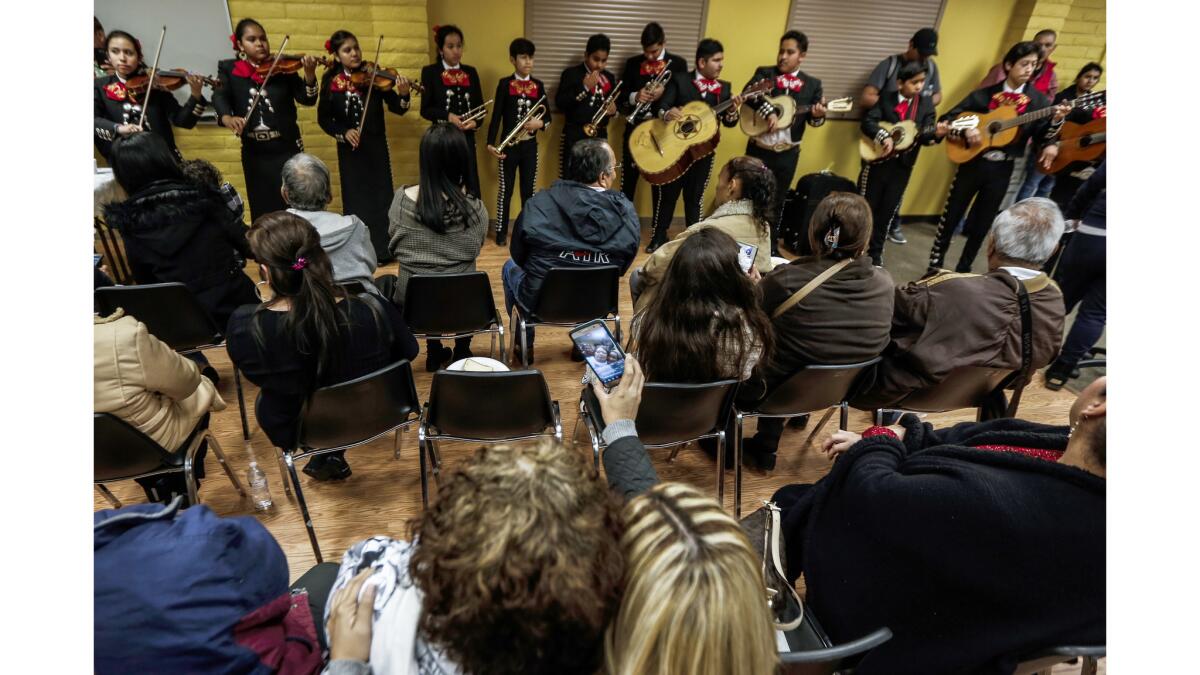Mexican program lets parents visit their children living illegally in U.S. after decades apart

- Share via
The round, wrinkled woman who stepped off the bus was not the mother Victor Castillo remembered leaving behind when he packed up his things 20 years ago and left their small Mexican town.
In his memory she was still 56, strong and slim. Now at 76, Albertina Garcia Ruiz had a fuller belly, a bad knee and wore her curly hair cropped short. Castillo took his mother by the arm and led her to meet her grandchildren.
“I love you,” he told her. “I’m so glad you’re here with us.”
In late January, 48 such mothers and fathers from the town of Nueva Italia arrived in Los Angeles. Some hadn’t seen their children in three decades.
Their visit was made possible by a program run by the government of the Mexican state of Michoacan that helps aging parents reunite with their children who have lived in the U.S. illegally for more than 10 years.
Castillo, 47, and his wife immigrated to California from Nueva Italia in 1998 to work and start a family. He now runs a landscaping business in Orange County.
His three children — two boys ages 19 and 14, and a 2-year-old girl — knew their grandmother only through photos and phone calls. As he and his mother walked up to the rest of the family, Garcia Ruiz let go of her son’s arm to place a kiss on the cheek of each grandchild.

“I can hardly believe it,” Castillo said. “Twenty years. Can you imagine?”
The program, called Palomas Mensajeras, which means “carrier pigeons,” helps Mexican parents over age 60 apply for a passport and a tourist visa. Gilberto Cobian Cervantes, director of migrant affairs for the Múgica municipality in Michoacán, said the process can be long and complicated, especially for older people from rural towns.
Other Mexican states, including Zacatecas, Puebla and Hidalgo, operate similar programs. Cobian Cervantes said the Michoacan program started last year and has since reunited more than 1,000 parents with their children in California. Different groups have gone to Illinois and other states.
Another group of 27 parents from Nueva Italia landed at San Jose International Airport on Friday.
Some parents have refused to sign up, thinking the program is a scam. Several people from the Los Angeles group said only one of their parents had gone through with it because the other was too skeptical.
The January reunion was emotional. More than 100 family members crowded near Spane Park in Paramount as they waited for a bus to arrive with their parents from Los Angeles International Airport.
The families carried balloons, bouquets of roses and handmade signs of welcome. As the sun set nearing 5 p.m., they grew anxious with anticipation.
When the bus pulled in, the crowd erupted in cheers. “They’re here!” one woman screamed as she rushed toward the bus. As if watching celebrities on a red carpet, family members pulled out cellphones to record the seniors stepping off the bus.
The last time Maria Luisa Garcia saw her mother, she was 21, newly married and about to move to the U.S. with her husband. As they said goodbye, her mother, Maria Elvira Espinoza, told Garcia not to go.
In the 17 years since, Garcia’s biggest wish has been to bring her mom for a visit or be able to visit her. But, being in the country illegally, the latter option was always out of the question for her.
Garcia, now 38 and living east of Los Angeles, missed her mom’s cooking — especially ribs in salsa negra — her advice and even her scoldings.
“Even as an adult, you always need your mother,” she said, carrying a large bouquet of roses, lilies and carnations.

The trip would be a time for old memories and new. Their plans for the three weeks included Las Vegas, Disneyland and the Hollywood Walk of Fame. Garcia looked forward to eating her mother’s arroz con leche the next morning for breakfast. That night, she would introduce her to Vietnamese cuisine.
Espinoza, 63, was one of the last people off the bus. Garcia rushed to her, and the women embraced and cried.
Later, Garcia recorded the mariachi performance on Facebook Live. After a few minutes, she flipped the camera around, wrapped an arm around her mom and smiled wide: their first selfie.
Sergio Huerta, 44, spent days preparing for his mother’s visit.
Though she would be staying just three weeks, he fixed up a spare bedroom in his San Bernardino County home and bought everything she’d need to move in: a bed, toothbrush, hairbrush, perfume, shirts, sweaters and jackets.
In the days leading up to their reunion, nerves kept him from sleeping. His wife and three children — all U.S. citizens — had visited his mother, Maria Delgado Renteria, in Mexico a couple of months previously.
Huerta, 44, talks to his parents twice every day but hadn’t seen them in 21 years, since just before he boarded a plan to Tijuana and crossed into California. His brother Alonso Huerta, 42, hadn’t seen them in 23 years.
Sergio stayed busy planning the reception. He organized a youth mariachi band to perform and arrived at the park hours early to set up the food and drinks.
The reunion brought mother and sons to tears.
“I thought I would never see her again,” Sergio said. “It’s like I fulfilled a dream. Now I can sleep soundly.”
Sergio’s father was one of the people who had refused to sign up, thinking the program was a fraud. Now he plans to visit his sons later this year.
Not everyone fared as well.
Yuri Vences was ecstatic when she found out there way a way to reunite with her mother, Josefina Baez, whom she hadn’t seen in 18 years.
Baez, 62, had completed the paperwork, gotten a passport and was seven days away from her visa appointment with the U.S. consulate in late December when she died of a heart attack.
Vences was devastated. Her father died 10 years ago. Her three children would never get to meet their grandparents.
“I can’t tell you how painful it was to have such a wonderful opportunity and then have it slip from my hands,” she said. “I thought we would finally do so many things that we weren’t able to all those years.”
For Vences, the loss was immeasurable. She had left home at 15 to reunite with the father of her 5-month-old baby boy, who had migrated to California for work.
She remembers her mother telling her not to go. Vences assured her that they would return after two years. But she stayed on, hoping to give her children a better life with more opportunities.
Vences always dreamed of bringing her parents for a visit. But applying for a tourist visa required proof of significant income from both her and her parents to show that her parents had reason to return to Mexico and that she could cover their costs while they were in the U.S. She thought they’d never qualify.
Now, Vences said she feels the pain of so many other immigrants. Her dream of someday returning to her hometown feels pointless without her parents there to welcome her back.
“Life no longer has meaning,” she said. “I missed the opportunity to enjoy it.”
More to Read
Sign up for Essential California
The most important California stories and recommendations in your inbox every morning.
You may occasionally receive promotional content from the Los Angeles Times.













